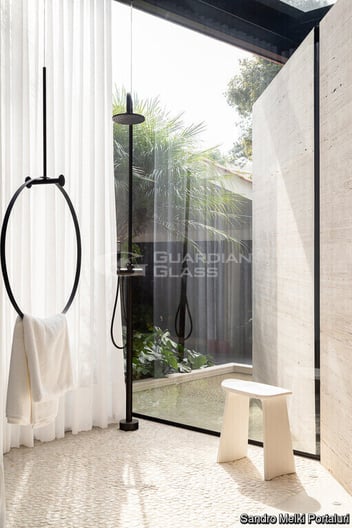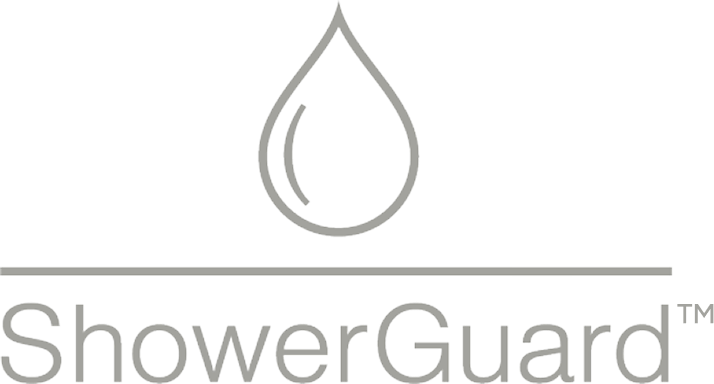Glass looks smooth—but it isn’t. It has microscopic peaks and valleys that aren’t visible to the naked eye. But the corrosion left behind on that porous, uneven surface? Unfortunately, that can be extremely visible, especially as it builds up over time.
If your fingers have ever ached from gripping a scrub brush as you struggle to make your shower sparkle like new again, you understand that pain—quite literally.
If you’re in the market for a new glass shower door, you might have heard about all the options to prevent this buildup. But how do these options work? Are they worth the extra cost? It can feel confusing and overwhelming—just one more thing added to the endless list of items to consider during your bathroom renovation.
But making the right choice means helping to protect your investment in your bathroom, so while it may feel like just another decision, it’s an important one.

To help, we’re going to dive into the science of three shower glass options:
1. Standard shower glass - Standard—also known as untreated—shower glass is porous and open to contamination. Impurities like limescale, dirt, and soap residue can become embedded in the pores, making removal very difficult. These contaminants then corrode and discolor the glass, causing it to fog—which can happen quickly in a bathroom’s humid conditions. Untreated shower glass offers no protection against corrosion.
2. Spray-on products - Spray-on products are normally hydrophobic, which means a coating fills the pores in your shower glass so contaminants slide off. However, in most cases, this coating is temporary so you will potentially need to reapply it according to the manufacturer’s directions. The lifespan of this coating may be shorter if a shower gets heavy use or has hard water, which has a high percentage of dissolved minerals.
3. Permanent coatings - ShowerGuard® glass is an excellent example of this type of coating. It permanently bonds a very thin, invisible coating to the surface of the glass, filling in those microscopic peaks and valleys. (You can check out the process in this video.)
As a result, the surface is permanently smooth; impurities can’t embed, causing corrosion and lasting discoloration. And, unlike protective films or spray-on sealants, this protective layer is applied in the factory during the production of the shower glass; it doesn’t degrade, which is why ShowerGuard comes with a Limited Lifetime Warranty.
|
|
Untreated standard glass |
Spray-on products |
Permanent coating |
|
Offers protection against corrosion |
|
✓ |
✓ |
|
Never needs reapplication |
|
|
✓ |
|
Sputter coat application |
|
|
✓ |
|
Offers limited lifetime warranty |
|
|
✓ |
|
Stays beautiful for a lifetime |
|
|
✓ |
If you’re remodeling your bathroom, you want it to stay beautiful for life — and, as the old saying goes, an ounce of prevention is worth a pound of cure.
Styles change, but ShowerGuard® glass stays beautiful for life.
Related articles

5 Reasons Your Bathroom Deserves ShowerGuard™ Shower Doors
Are you renovating your bathroom? Then you know it’s a serious investment—in both time and money. Bathroom renovation can be a long, expensive process, and there’s nothing worse than having to return to repair, redo, or replace part of that renovation a few months or years down the line.

7 Tips to Design a Spa-Like Bathroom with Shower Glass
Spa-like Bathrooms are Trending: 7 Tips to Create Your Own The last few years have made the bathroom a space for much sought-after relaxation and privacy, and our growing interest in wellness and self-care has increased our desire for spa-like spaces within our home. If you’re planning to renovate your bathroom soon, you’re probably thinking about how to make it a space you can truly enjoy. A...


7 Ways to Future-Proof Your Bathroom with Quality Shower Glass
Bathroom remodels are among the most popular projects homeowners take on. And that’s for a good reason: while these projects can be costly and time-consuming, bathroom renovations provide a reliable return on investment. According to the New York Times, in all 50 states, the average bathroom makeover increases a home’s resale value by more than what the renovation costs upfront.

How to Care for and Clean Your ShowerGuard™ Shower Door
After the last few years, many people vowed to do more of the things they enjoy and less of the things they don’t. And let’s face it: for most of us, scrubbing the shower is on that second list—and, unfortunately, showers don’t clean themselves.

